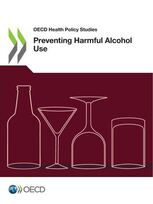OECD puts alcohol on the agenda:
New report highlights benefits of policy measures to prevent harmful alcohol consumption
OECD recently released the report “Preventing harmful alcohol use”. It highlights that if governments invest in policies to reduce harmful alcohol consumption, they could save millions of lives. The economic benefits of putting them in place would also be much higher than the costs.
The report focuses on life expectancy estimations over the next 30 years. On average a reduction of 0,9 years can be expected in 52 OECD, European Union and Group of 20 (G20) countries due to diseases and injuries from alcohol consumption. The estimate varies widely across countries with the largest reduction in life expectancy expected in Central and Eastern Europe.
Heavy episodic drinking remains prevalent In OECD countries with 30% of adults engaging in binge drinking at least once a month. The report a large share of alcohol is drunk by a minority of drinkers, increasing the risk for harm. The report also looks at the effect of COVID-19 on alcohol consumption and finds that the impact is mixed. A bigger proportion drank more frequently (43%) compared to those who drank less frequently (25%), while about a third (32%) reported no change.
Diseases and injuries from alcohol consumption has high economic cost. Alcohol consumption above a certain low risk threshold (defined in the OECD report as above 1,5 drinks per day for men and 1 drink per day for women), cause medical costs equal to 2.4% of total health expenditure each year. The loss in productive due to alcohol use is also considerable. Together medical costs and productivity loss is estimated to reduce the GDP in the countries in the study by 1,6%. This will also vary depending on the level of alcohol consumption in different countries, up to an estimated 3,8% loss in GDP in Lithuania.
The report points out that effective alcohol policies exist but are not used to the full in OECD countries. It makes a strong economic case for enhancing policies to tackle harmful alcohol consumption. A comprehensive approach, including alcohol advertising regulations and ban on alcohol advertising to children; use of sobriety check points to counter drink-driving and prevent alcohol-related traffic injuries; strengthening counselling in primary care for patients with harmful alcohol consumption; and price policies such as alcohol taxation and minimum unit pricing for cheap alcohol, would have the biggest impact, according to the report.
RELATED ARTICLES
- Highlighting the COVID-19 – alcohol connection
- Alcohol among risk factors increasing
- Alcohol use - a barrier to health and to the achievement of the SDGs
- Government investments in alcohol industry up against the wall
- Abstracts for GAPC 2020 – deadline 29 July 2019
- A regional African alcohol coordination mechanism is needed
- New book reveals a series of unethical business practices by Heineken in Africa
- Next GAPC to be held in Dublin in March 2020
- SAFER – a new WHO initiative to boost national alcohol policy processes
- Trouble Brewing

